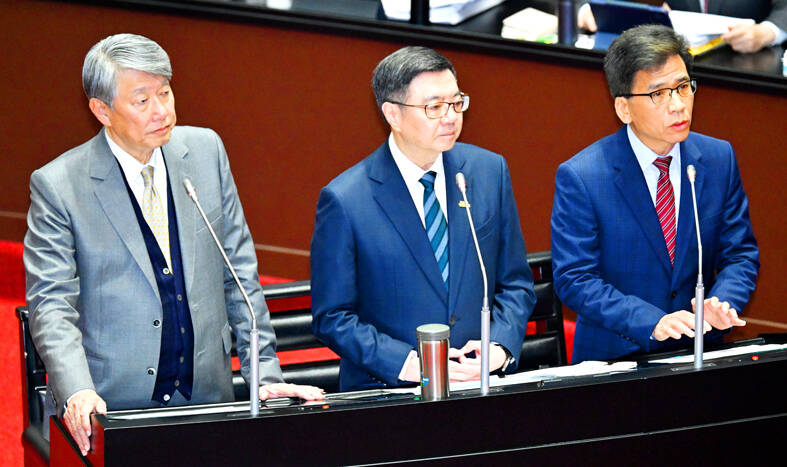The Ministry of Economic Affairs has fined Any Technology Pvt (AnyTech, 認和科技), a Singapore-based financial technology firm, NT$2.17 million (US$65,764) over national security issues that contravened investment rules, Minister of Economic Affairs J.W. Kuo (郭智輝) told lawmakers yesterday.
Chinese-language media reported earlier that AnyTech — which is registered in Singapore, but is backed by Chinese capital — set up a subsidiary in Taiwan and undertook a project to upgrade a core credit card system of Cathay United Bank (國泰世華銀行).
Regulations ban Chinese military and Chinese Communist Party-owned companies, as well as firms backed by Chinese capital, from investing in Taiwan due to concerns that Beijing could gain access to Taiwan’s key technologies and information.

Photo: Liao Chen-hui, Taipei Times
An investigation found that AnyTech has received Chinese capital, Kuo said, adding that some of the money came from Beijing-based Rivere Tech (江融信科技), which is a Chinese enterprise 25 percent owned by China's National SME Development Fund Co (國家中小企業發展基金), an equity fund in which the Chinese Ministry of Finance is a major shareholder.
Under Article 73 of the Act Governing Relations Between the People of the Taiwan Area and the Mainland Area (兩岸人民關係條例), Chinese companies "may not engage in any investment activity" in Taiwan unless permitted by the relevant authorities, and under Article 93 of the same act, Taiwanese authorities can levy an administrative fine of up to NT$25 million on entities that violate the aforementioned article, according to Kuo.
The minister’s remarks came after Democratic Progressive Party Legislator Michelle Lin (林楚茵) raised the issue at the legislature.
Controlled by an agency of the Chinese Ministry of Finance, AnyTech poses a major national security risk if it attempts to access Taiwan’s core credit card technology, and get involved in local credit card and life insurance businesses, Lin said.
Lin asked the ministry, the Financial Supervisory Commission and the Ministry of Digital Affairs to bolster the review mechanism to assess whether firms have received Chinese backing in the face of the increasing threat from the Beijing-orchestrated “red supply chain,” she said.
Government agencies should collaborate with financial institutions to beef up development of the domestic fintech supply chain, ensure that Taiwan can provide its own core financial systems and reduce its reliance on Chinese companies, she said.
Cathay United Bank said in a statement yesterday that it had on Feb. 24 notified AnyTech that it was terminating their contractual relationship ahead of schedule.
The bank also said it had not used the service provided by AnyTech.
A cybersecurity review released by CHT Security Co (中華資安國際) on Friday last week showed that the source code provided by AnyTech revealed no suspicious backdoors, no malicious network connections and no encryption or obfuscation, therefore there was no risk of information leakage, the bank said.

Micron Memory Taiwan Co (台灣美光), a subsidiary of US memorychip maker Micron Technology Inc, has been granted a NT$4.7 billion (US$149.5 million) subsidy under the Ministry of Economic Affairs A+ Corporate Innovation and R&D Enhancement program, the ministry said yesterday. The US memorychip maker’s program aims to back the development of high-performance and high-bandwidth memory chips with a total budget of NT$11.75 billion, the ministry said. Aside from the government funding, Micron is to inject the remaining investment of NT$7.06 billion as the company applied to participate the government’s Global Innovation Partnership Program to deepen technology cooperation, a ministry official told the

Taiwan Semiconductor Manufacturing Co (TSMC, 台積電), the world’s leading advanced chipmaker, officially began volume production of its 2-nanometer chips in the fourth quarter of this year, according to a recent update on the company’s Web site. The low-key announcement confirms that TSMC, the go-to chipmaker for artificial intelligence (AI) hardware providers Nvidia Corp and iPhone maker Apple Inc, met its original roadmap for the next-generation technology. Production is currently centered at Fab 22 in Kaohsiung, utilizing the company’s first-generation nanosheet transistor technology. The new architecture achieves “full-node strides in performance and power consumption,” TSMC said. The company described the 2nm process as

POTENTIAL demand: Tesla’s chance of reclaiming its leadership in EVs seems uncertain, but breakthrough in full self-driving could help boost sales, an analyst said Chinese auto giant BYD Co (比亞迪) is poised to surpass Tesla Inc as the world’s biggest electric vehicle (EV) company in annual sales. The two groups are expected to soon publish their final figures for this year, and based on sales data so far this year, there is almost no chance the US company led by CEO Elon Musk would retain its leadership position. As of the end of last month, BYD, which also produces hybrid vehicles, had sold 2.07 million EVs. Tesla, for its part, had sold 1.22 million by the end of September. Tesla’s September figures included a one-time boost in

Shares in Taiwan closed at a new high yesterday, the first trading day of the new year, as contract chipmaker Taiwan Semiconductor Manufacturing Co (TSMC, 台積電) continued to break records amid an artificial intelligence (AI) boom, dealers said. The TAIEX closed up 386.21 points, or 1.33 percent, at 29,349.81, with turnover totaling NT$648.844 billion (US$20.65 billion). “Judging from a stronger Taiwan dollar against the US dollar, I think foreign institutional investors returned from the holidays and brought funds into the local market,” Concord Securities Co (康和證券) analyst Kerry Huang (黃志祺) said. “Foreign investors just rebuilt their positions with TSMC as their top target,